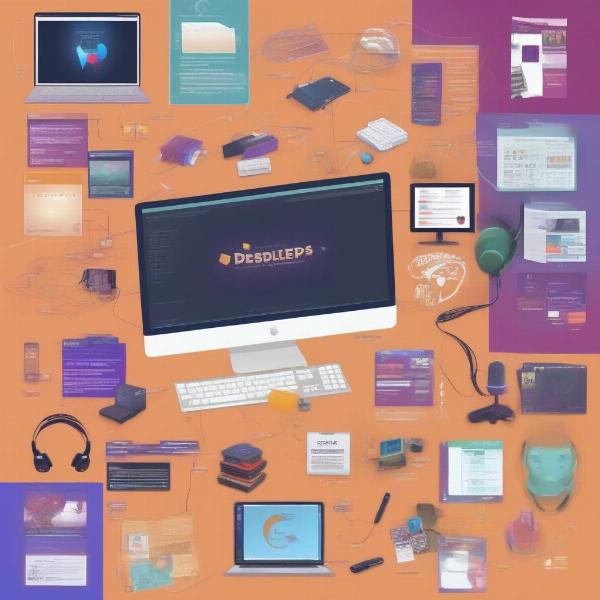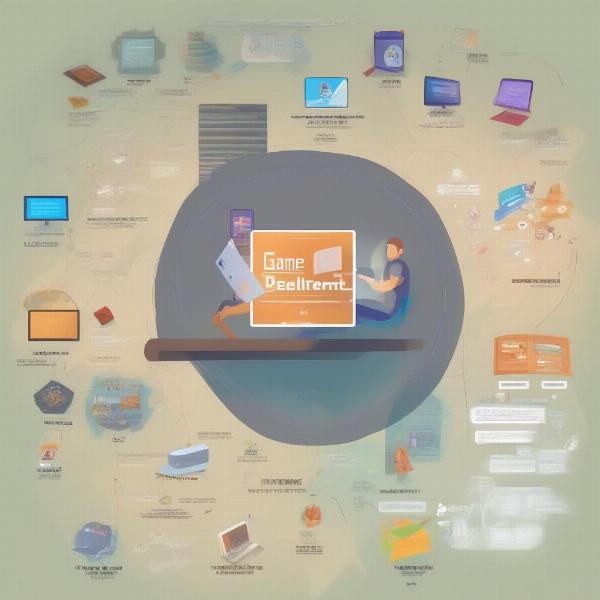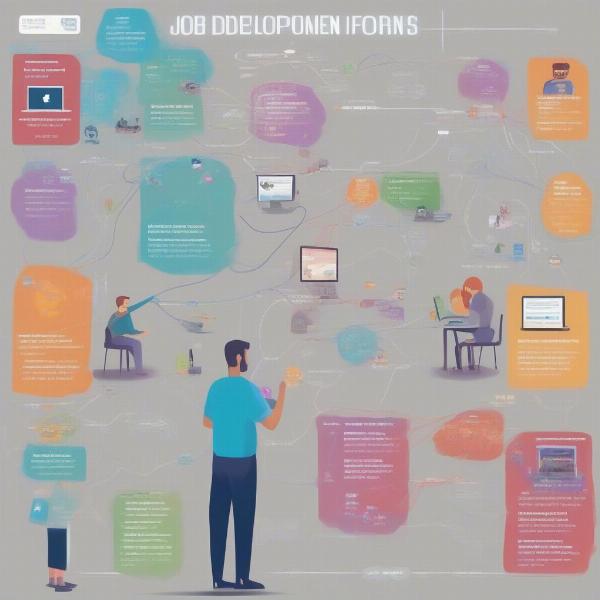The video game industry is a vibrant, ever-evolving landscape. For those captivated by the magic of gaming and dreaming of crafting their own virtual worlds, the question of “How To Get Into Video Game Development” is a natural starting point. This guide provides a comprehensive roadmap to navigate the exciting path into video game development.
Getting started in game development can feel daunting, but breaking it down into manageable steps simplifies the process. Whether you envision yourself designing intricate game mechanics, crafting immersive narratives, or bringing characters to life through stunning visuals, a path awaits you.
Choosing Your Game Development Path
The first step is identifying your area of interest. Game development involves various specialized roles, each contributing uniquely to the final product. Do you aspire to be a programmer, meticulously crafting the underlying code that powers the game’s mechanics? Or perhaps a game designer, the architect of the gameplay, levels, and overall user experience? Maybe the artistry of a 3D modeler, sculpting characters and environments, or a sound designer, weaving audio landscapes, calls to you. Even within these specializations, there are sub-specialties. For example, programming can involve gameplay programming, AI programming, or graphics programming. Understanding these distinctions allows you to focus your learning and skill development. Similar to how game mods evolve, so do the skills needed to develop them. If you’re interested in exploring game modding on Android, check out this guide on how to mod games on android.
Acquiring Essential Skills
Once you’ve chosen your specialization, focus on acquiring the necessary skills. For programmers, proficiency in languages like C++, C#, or Python is crucial, along with a strong understanding of game engines like Unity or Unreal Engine. Aspiring game designers benefit from studying game design principles, level design, and user interface/user experience (UI/UX) design. Artists should master 3D modeling software like Blender or Maya and develop a keen eye for aesthetics. For sound designers, expertise in audio editing and mixing tools is essential. There are numerous online resources, tutorials, and online courses available to help you build these skills, regardless of your chosen path.
 Essential Resources for Learning Game Development
Essential Resources for Learning Game Development
Building Your Portfolio
A strong portfolio is your calling card in the game development industry. Start by working on personal projects. These can be small, simple games that demonstrate your skills. Participating in game jams, where you create a game within a limited timeframe, provides invaluable experience and portfolio pieces. Contributing to open-source game projects is another excellent way to gain experience and collaborate with other developers. Building a portfolio isn’t just about showcasing finished games; it also demonstrates your problem-solving abilities, technical skills, and creative thinking. This process is similar to creating your own simple games, such as io games. If you’re curious about that process, you can learn more about how to create io games.
Education and Formal Training
While a formal degree isn’t strictly required for entry into game development, it can provide structured learning and networking opportunities. Consider pursuing a degree in computer science, game design, or a related field. Many universities and colleges offer specialized game development programs. These programs often cover a broad range of topics, from programming and design to art and animation. Even for self-taught developers, formal education can offer a valuable foundation and access to industry professionals.
 Various Educational Paths for Game Developers
Various Educational Paths for Game Developers
Networking and Building Connections
Networking is crucial in the game development industry. Attend industry events, conferences, and online forums to connect with other developers, recruiters, and potential employers. Building relationships within the industry can lead to job opportunities, mentorship, and valuable insights. Active participation in online communities, such as game development forums and social media groups, can help you stay updated on industry trends and connect with like-minded individuals. Just like understanding the legitimacy of a video game company is important, so is building your network of contacts. For insights into evaluating game companies, see our article on is the video game company legit.
Landing Your First Role
Once you’ve built a solid portfolio and network, you can start applying for entry-level positions. Look for internships, junior developer roles, or QA tester positions. These roles provide valuable on-the-job experience and a foot in the door. Be prepared to showcase your portfolio and demonstrate your passion for game development during interviews. Don’t be discouraged by rejection; perseverance is key in this competitive industry. Developing games for different platforms, such as iOS, requires specific knowledge and skills. Learn more about how to make an ios game in our comprehensive guide. Similarly, if Android game development interests you, we have a guide on how to make an android game.
 Searching for Game Developer Jobs
Searching for Game Developer Jobs
Related Concepts: Game Engines and Platforms
Understanding the nuances of game engines and target platforms is also crucial for aspiring developers. Each engine and platform offers its own set of advantages and challenges. Familiarizing yourself with popular choices like Unity, Unreal Engine, and Godot, and understanding their strengths and limitations, allows you to make informed decisions about which tools align best with your project goals.
Expanding Your Knowledge: Game Genres and Design Principles
Delving into various game genres and design principles can broaden your perspective and enhance your creative toolkit. Exploring different genres exposes you to various gameplay mechanics, narrative structures, and artistic styles. Studying design principles helps you understand the underlying concepts that make games engaging and fun.
Conclusion
Breaking into the video game development industry requires dedication, perseverance, and a genuine passion for gaming. By focusing on skill development, building a strong portfolio, networking effectively, and continuously learning, you can pave your way towards a fulfilling career in this exciting field. So, take the first step, embrace the challenge, and embark on your journey into the world of video game development.
FAQ
-
What programming languages are essential for game development? C++, C#, and Python are commonly used.
-
Do I need a degree to work in game development? While not mandatory, a degree can be beneficial.
-
What is the best game engine for beginners? Unity is often recommended for its user-friendly interface.
-
How can I build a portfolio without professional experience? Personal projects and game jams are great starting points.
-
How important is networking in the game industry? Networking is crucial for finding opportunities and learning from others.
-
What are some common entry-level roles in game development? Internships, junior developer roles, and QA tester positions are common entry points.
-
How can I stay updated on industry trends? Engage with online communities, attend conferences, and follow industry news.

